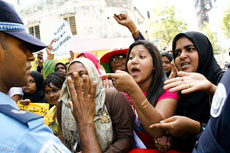Home Minister Dr Mohamed Jameel Ahmed announced that the government intends to shut down the Second Chance Program, alleging that the former administration had used the program “to release unqualified criminals under political influence and without any clear procedure “.
Speaking at a press conference on Sunday, the Home Minister alleged the program was politically influenced and claimed that it was set up in violation of the parole system and the Maldivian laws.
He claimed that several inmates who did not qualify for social re-integration were released during the program based on a list approved by then-President Office.
The “uncontrolled release of criminals” over the recent years had threatened the public safety, Jameel further alleged.
“The [incarcerated] criminals have been released without any control in the past days to a level public safety has been threatened. Those criminals were released by sidelining the Maldivian laws,” Jameel claimed.
According to him, a total of 1879 criminals were incarcerated for various offenses during Nasheed’s term, but only 621 are currently remaining in prisons while 1258 have been released with no clear procedure.
Therefore, he said that the program will be shut down and all its responsibilities will be tasked to the Parole Board and Clemency Board, which will be re-formed in the coming week.
However, both boards have been criticised over the years for being “slow and ineffective”.
“All hope lost”
In an interview to Minivan News following the government’s announcement to shut down the program, former Manager of the Second Chance initiative, Aishath Rasheed said that the Parole and Clemency board “does not have the technical expertise to continue the program”.
“I was a member of the parole board. Both boards exist as mere names. Some members do go for the meetings but have to go back home because the meetings cannot be held due to lack of quorum,” Rasheed said. “Because of the lack of attendance, the efforts to reintegrate the inmates back into the society were severely delayed”.
She highlighted that a majority of the prison population were young people incarcerated for small drug offences and that the “long jail terms were destroying their lives”.
Therefore she explained that the Second Chance Program was set up by the deposed President Mohamed Nasheed in September 2011 to expedite the re-integration of former inmates incarcerated for drug offences back into the society.
According to the UNDP report, “Prison Assessment and Proposed Rehabilitation and Reintegration of Offenders Report“, published last year, 66 percent of all prisoners in the Maldives at the time of report were in jail for drug use or possession, often small quantities, while the majority were males under 30 years of age with education below O-levels.
“With the inception of the program a second opportunity was given to the young inmates by providing employment assistance, counselling for substance abuse, mentoring and other services to help to reduce recidivism,” Rasheed said.
“But with the shutting down of the program that opportunity is lost now. Those inmates and their parents had high hopes. But all hope is lost now,” said Rasheed, who was also a member at the parole board.
She further noted that several parents of inmates have called her up since she was dismissed from the position.
“We had finished training 50 inmates and they were ready to be released when this happened. Their parents are now calling up to ask me what will happen to them. I don’t have an answer to that,” she said.
She requested the government continue the second chance program, insisting that the program was “politics free”.
“There was absolutely no politics. Nobody instructed us on whom to release,” added Rasheed.
All 439 inmates released were thoroughly evaluated and approved by the courts while any former inmate found to have violated the terms of the release were sent back to the prison to complete their jail term.
During the chaotic events of February 7, Rasheed said a group of rogue security personnel involved in the mutiny against Nasheed’s government stormed into the Second Chance office inside the Ghazee Building and gassed the office.
“Four policemen and two MNDF officers into the office that morning and shouted at us to go upstairs. One of our project managers, who sits in a wheel chair, asked them how she could go upstairs when there was no lift. The policemen left but came back later and ordered us to leave again. They shouted that ‘this office is a big nuisance’ and sprayed some sort of gas and left,” Rasheed recalled.
Likes (0)Dislikes
(0)Dislikes (0)
(0) 
